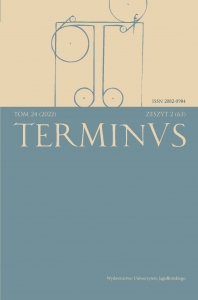Academiae voluntas mihi potior est… Letters by the Livonian Humanist and Lawyer David Hilchen to the Professors of the Academy of Zamość 1603–1609
"Academiae voluntas mihi potior est…" Letters by the Livonian Humanist and Lawyer David Hilchen to the Professors of the Academy of Zamość 1603–1609
Author(s): Kristi ViidingSubject(s): Cultural history, Recent History (1900 till today), Higher Education , Sociology of Education
Published by: Wydawnictwo Uniwersytetu Jagiellońskiego
Keywords: early modern letter-writing; Academy of Zamość; pleasant place; a desperate place; constancy; friendship;
Summary/Abstract: This paper presents (in the form of edition and commentary) forty-five letters written by a humanist and lawyer from Livonia, David Hilchen (1561–1610) to the professors of the Academy of Zamość, and one letter to Hilchen by the poet Szymon Szymonowic. The introductory analysis of these letters, all from 1603–1609, suggests that Hilchen portrayed the academic environment created by the Grand Chancellor and Grand Hetman Jan Zamoyski in a dichotomous manner. In the first decade of its activities (almost until the death of Jan Zamoyski in 1605) it is depicted by Hilchen as a mental locus amoenus, a place for beautiful minds. Zamoyski’s death made the situation more precarious for the academy, which was then depicted by Hilchen using motifs characteristic of the locus desperatus: the loss of light and warmth, the rise of calumny, the decline in the quality of education. Yet according to Hilchen’s letters, despite external political and partly religious pressure, even stronger friendships and greater loyalty developed between the members of the academy. In shaping and describing this strategy of humanist friendship against desperation and calumny in everyday situations, Hilchen referred inter alia to the experiences of his previous correspondent, Justus Lipsius, as expressed in Lipsius’ letters, his treatise De Constantia and his speech De Calumnia. Without belonging to the academic staff in sensu stricto and without direct interest in his own academic achievement, Hilchen stood up for its humanist and academic ideals despite the external changes.
Journal: TERMINUS
- Issue Year: 24/2022
- Issue No: 2 (63)
- Page Range: 157-211
- Page Count: 55
- Language: English

